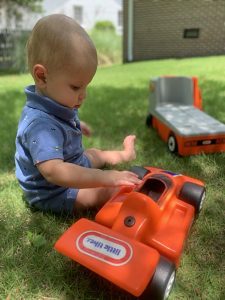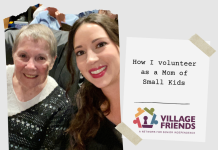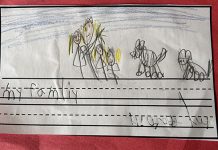 “I’m leaving. See you in a bit. Have fun!” Mom and/or Dad wave and walk away without so much as a backward glance. Their toddler waves “‘bye ‘bye,” happily picks up a toy, and joins the other toddlers. Sound familiar? Yeah, me neither. All three of our children went through a crying phase when we left them, but our youngest had to be peeled off my leg every time. I always left assuring her I’d be back soon and waited out of sight to see if she calmed down. She always did, so even though the initial separation was hard on both of us, I left reassured that she was okay.
“I’m leaving. See you in a bit. Have fun!” Mom and/or Dad wave and walk away without so much as a backward glance. Their toddler waves “‘bye ‘bye,” happily picks up a toy, and joins the other toddlers. Sound familiar? Yeah, me neither. All three of our children went through a crying phase when we left them, but our youngest had to be peeled off my leg every time. I always left assuring her I’d be back soon and waited out of sight to see if she calmed down. She always did, so even though the initial separation was hard on both of us, I left reassured that she was okay.
Most kids experience a degree of separation anxiety at some point in their early years. It’s a normal part of their growth and development. They become attached to parents and familiar caregivers and become anxious when separated from them. It can last for a few months or can continue into their elementary years. With the youngest, it continued into first grade.
What causes some children to be more anxious than others? An article on kidshealth.org that I read recently suggested that prolonged anxiety can result from “certain life stresses…a new caregiver, a new sibling, moving to a new place, or tension at home.” Any of these things can unsettle children and cause separation anxiety. But, in general, some degree of crying when separated from parents is a sign of a normal healthy attachment. How parents handle the situation can impact the duration of the phase and help everyone get through it a little more easily.
- Explain to your child ahead of time that you are going to leave them in the nursery, at daycare, with a sitter, etc.
- If the situation or caregiver is unfamiliar, try to either visit with the caregiver or take your child into the situation a few days ahead of time. If that’s not possible, arrive early and arrange to spend a few minutes with your child in the new situation.
- Have a routine. Just like a bedtime ritual helps children feel secure and fall asleep more easily, a routine before leaving can be helpful. When I learned to lay out clothing and pack the diaper bag the night before, our morning routine was much smoother. This helped us all arrive at the caregiver’s location without things being rushed or tense.
- After doing the above, tell your child, “I’m leaving” and then do so. When you return after a reasonable amount of time, your child learns to trust that you will come back. While slipping out after your child is distracted might seem less traumatic for you and your child, it can actually cause them more anxiety in the long run. If you tell them “I’m leaving,” they might cry, but they know you are leaving. There’s less fear that you might disappear at any time. They might be sad you’re going, but they learn to trust that you will tell them when you do.
- Don’t keep going back if the child continues to cry. After ascertaining that the child is fine, there’s no danger, and the caregiver is capable, walk away. If you continue coming back, the child may begin to use crying as a way to keep you from going. Times apart from parents help the child learn independence and to enjoy times with others. It’s also good for the parents to have a break and do things with other adults.
- Make every effort to return at the time you tell your child you will do so. Sometimes delays are unavoidable, but try to consistently return on time. This develops trust between you and your child and also helps them see that you will keep your promises.
If your child’s separation anxiety persists and doesn’t seem to be resolving, you need to make sure their caregiving situation is safe and that there are no bullying issues, etc. going on with classmates. Consider bringing your doctor into the loop for help and advice.
I believe the reason our youngest had difficulties in first grade probably had something to do with the fact that due to various unforeseen and unavoidable circumstances she had three different teachers in succession within the first semester of school. The second semester was a little chaotic as well. However, we did our best to help her navigate it all and by doing so, hopefully equipped her to be resilient and handle life’s challenges. Something must have worked since she is currently happily living 4,200 miles away.
Every child is different. Our oldest got through the separation phase quickly. In fact, she informed us around junior high age “I’m going to go live far away. You are welcome to come visit me, but I just want you to know that I’m leaving when I get old enough.” Good for her.
One of our tasks as parents is to prepare our children to live their lives independent of us. We want to teach them to have healthy relationships with us and with others. Encouraging them to be confident on their own is part of that.
“I’m leaving” doesn’t have to be unsettling. It can be an invitation for our kids to explore new experiences, an opportunity for them (and us) to enjoy a little freedom, and a lot of fun telling each other our adventures when we get back together.
Happy spring!
Blessings!

Separation Anxiety article March 2023 on kidshealth.org











